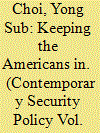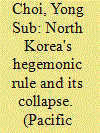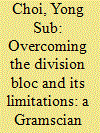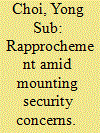|
|
|
Sort Order |
|
|
|
Items / Page
|
|
|
|
|
|
|
| Srl | Item |
| 1 |
ID:
174732


|
|
|
|
|
| Summary/Abstract |
Seoul and Washington have conceded that Terminal High Altitude Area Defense (THAAD) in South Korea cannot protect the capital region of Republic of Korea (ROK), including Seoul and Incheon, from North Korea’s missile attacks. Why did the South Korean government decide to deploy THAAD, risking possible retaliation from China, although it already knew its limited utility on the Korean peninsula? This article addresses the puzzle by connecting the deployment of THAAD in South Korea with the U.S. conception of a strategic rebalancing to Asia. By linking South Korea’s decision to deploy THAAD with contemporary alliance politics, extended deterrence, and abandonment and entrapment risks, it argues that Seoul’s THAAD decision was primarily intended to sustain and strengthen the U.S.-ROK alliance amid escalating nuclear threats by North Korea and deepening Sino-American rivalry.
|
|
|
|
|
|
|
|
|
|
|
|
|
|
|
|
| 2 |
ID:
153728


|
|
|
|
|
| Summary/Abstract |
Ideological leadership through the Party was at the core of the North Korean leaders’ hegemonic rule over the people, which resulted in the great popularity of Kim Il-sung. Marketisation in the wake of the economic crisis, however, significantly impaired the mechanism for rule by consent, especially by triggering the influx of outside information and undermining the Party's ideological education activities. The economic crisis led the state to adjust the mechanism of consent and coercion in such a way that the state's control over society could be restored by relying more on rule by force, which was demonstrated by the much stricter penal system, bloody purges and, most of all, military-first politics. This, nonetheless, was a temporary measure because, in Guha's terms, ‘dominance without hegemony’ would not be durable in the long term. The regime can sustain itself in the long-term only through the reinstatement of the consent mechanism, which disintegrated owing to the marketisation. However, as the marketisation, being beneficial to those who have power as well as ordinary people, is irreversible in North Korea today, the reestablishment of hegemonic rule would not be attainable.
|
|
|
|
|
|
|
|
|
|
|
|
|
|
|
|
| 3 |
ID:
174561


|
|
|
|
|
| Summary/Abstract |
Colonialism affects post-colonial social formations in a variety of ways. Japanese colonial rule had a far-reaching influence on South Korean post-colonial social formation. Most legacies of colonialism diminished as time went by, but one legacy of colonialism continued or even increased its effects on the South Korean political economy from the 1960s – namely, the division of Korea. This article provides an alternative Gramscian approach to the analysis of the social formation of South Korea, with due consideration of the division of the peninsula. For that purpose, it introduces the concept of a division bloc, adapting Gramsci’s concept of a historical bloc to develop an analysis of a social formation that is unique to South Korea. Then, I explicate the two events that have been most damaging for the division bloc – the 1997 economic crisis and the 1998–2007 inter-Korean reconciliation – describing them as an organic crisis and a hegemonic project, respectively. Following this, I present reasons why the counter-hegemonic efforts of liberal nationalists to overcome the division bloc failed.
|
|
|
|
|
|
|
|
|
|
|
|
|
|
|
|
| 4 |
ID:
166010


|
|
|
|
|
| Summary/Abstract |
The 1998–2007 inter–Korean reconciliation was paradoxical because there were aggravating military tensions during the same period. To solve the security puzzle, this paper employs a Gramscian approach and argues that the reconciliation was pursued as hegemonic projects by the ruling political groups in North and South Korea. In South Korea, the economic crisis in 1997 led counter-hegemonic liberal nationalists to take political power, and the new ruling political group implemented the engagement policy toward Pyongyang to attain hegemony. In North Korea, the existing ruling political group sought to reconcile with Seoul, mostly for material gains to maintain hegemony by stopping the ongoing economic crisis from developing into a political crisis without a full–scale reform of the system. In the process, each capitalized on unication nationalism, which had a strong national– popular force because of the division of Korea. The rapprochement was carried out primarily to exhibit their contributions to unication, which could be signicantly conducive to their winning the domestic struggle for hegemony.
|
|
|
|
|
|
|
|
|
|
|
|
|
|
|
|
|
|
|
|
|